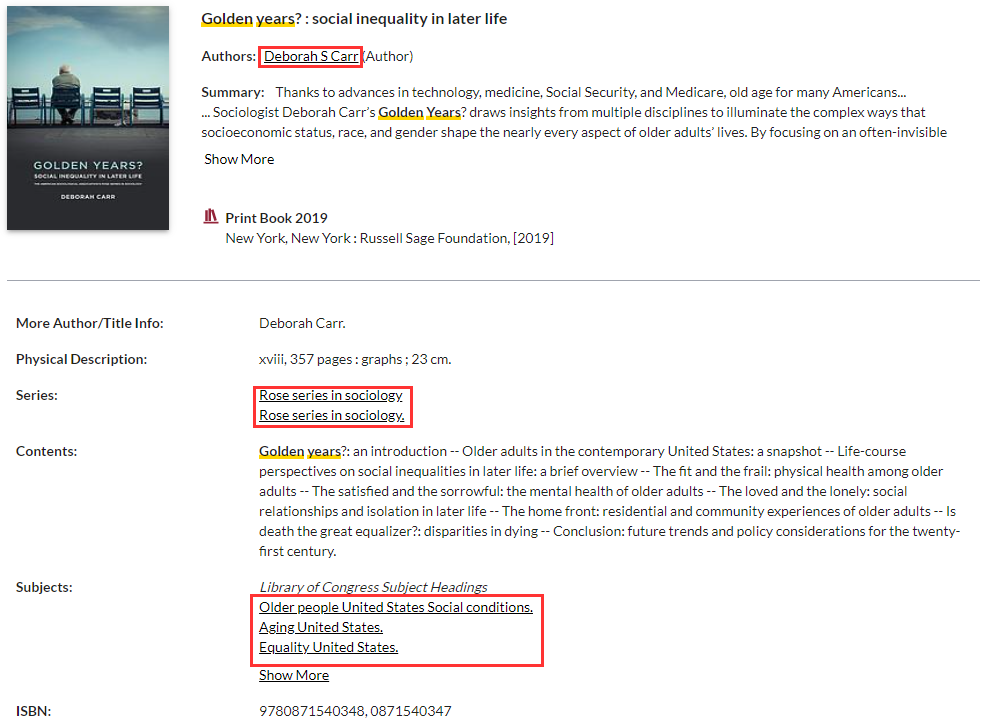Searching
Search tips
With Sofia, you can use different types of operators to define, as accurately possible, your search criteria and language. These operators apply to basic searches and advanced searches.
Boolean operators (AND, OR, NOT)
Boolean operators are inserted between keywords in a search box or between search boxes to connect or exclude certain words or phrases. For Sofia to recognize them, Boolean operators must be UPPERCASE. Keywords and their Boolean operators are processed left to right.
| AND | Narrows search results by returning only items that include both words/ phrases connected through the operator.
Example: photography AND war * If no other operator is entered in the search box, a Boolean AND is by default inserted between the words. |
| OR | Broadens search results by returning items that include either word/phrase connected through the operator.
Example: teen OR adolescent. |
| NOT | Reduces search results by excluding items that include the word/phrase after the operator.
Example: "renewable energy" NOT hydroelectricity |
More information on Boolean operators.
Quotation marks
Use English (" ") quotation marks to find an exact phrase or the closest words.
Examples:
- "attention deficit disorder"
- "Philippe Aubert de Gaspé"
Truncation
An asterisk (*) isolates the root of a word to include all variations or words from the same family. This generally increases search results. At least three letters must precede the asterisk.
Example:
- environment* = environment / environments / environmental / environmentally / environmentalism / environmentalist
More information on truncation
Wildcards
A pound sign (#) or question mark (?) substitutes one or several variable letters in a word. Wildcards broaden search results. At least three characters must precede the wildcard.
The pound sign (#) substitutes only one letter.
Examples:
- Thes#s = thesis, theses
- Wom#n = woman, women
The question mark substitutes several letters (0 - 9).
Example:
- Encyclop?dia = encyclopedia, encyclopaedia
Parentheses
Specify the order in which Boolean operators are applied to group keywords. Once the search is launched, Sofia interprets the words and operators in parentheses first, and interprets the words and operators outside the parentheses last.
Example:
- (computer* OR electronic*) AND (waste OR disposal) AND environment*
Indexes
Most search indexes are displayed in the advanced search window, but you can also enter their abbreviations in the in search boxes (basic or advanced search), and combine them with different operators.
*NOTE: a colon (:) after an abbreviation launches a keyword search in the index, but the equal sign (=) is used to find a specific phrase in the index In the latter case, the phrase must be located at the beginning of the field in question, without any words after, which significantly narrows results. When in doubt, use a colon with quotation marks.
Example:
- ti=early childhood
- means that we’re looking for documents precisely entitled “Early Childhood”. A document entitled "Early Childhood : A Survey of Best Practices" would therefore not be included in the search results.
- ti:"early childhood"
- searches for the phrase "early childhood" wherever it may be within the title field, even in combination with other words.
The following list includes the most commonly used indexes and their abbreviations:
| Author | au:shakespeare
au=shakespeare william |
| Call number | nu:PS 3515*
nu=QD 96 M65 M66 2019 |
| ISBN | bn:9782742798247 |
| ISSN | in:0018-165x |
| Keyword | kw:childhood
kw=early childhood |
| Language | ln:fra |
| Editor | pb:Springer
pb=Cambridge University Press |
| Subject | su:chemistry
su=chemistry, organic |
| Title | ti:Trainspotting
ti=Brave New World |
| Year of Publication | yr:2020
yr:2010-2019 |
| Barcode | bq:X38579059 |
| Format | x0:artchap
Format abbreviations |
Do not use spaces between index abbreviations and punctuation marks ( : or =), or between punctuation marks and keywords. Ex. : au=shakespeare william
Clicking on index words
Clicking on author (au=), subject (su:) or collection (se:) in items in results lists automatically launches a new index search.

Examples of new searches generated by clicking on item links:
- au=Carr, Deborah S
(Displays all of the author's publications) - se:Rose series in sociology
(Displays all of the publications in the series) - su:Aging United States
(Displays all publications related to the subject matter)

